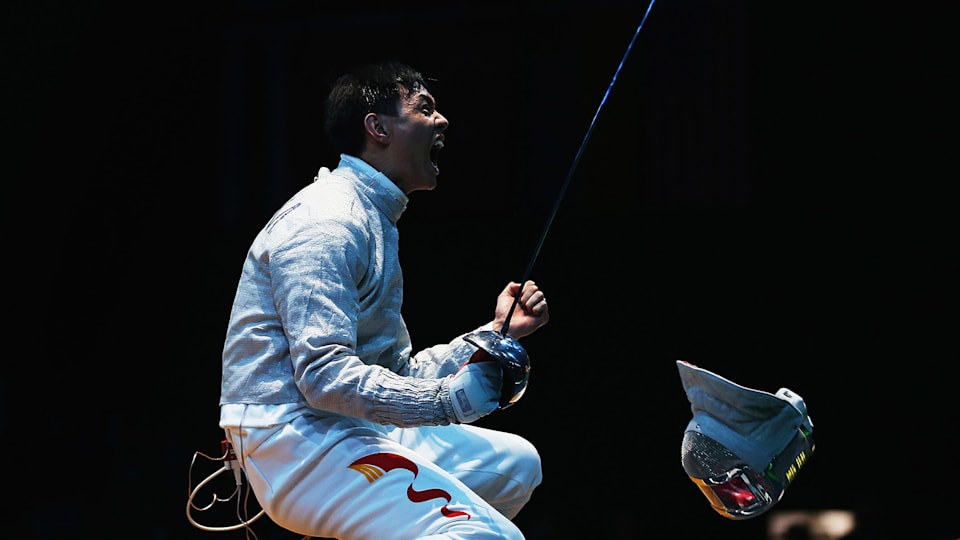
An Olympic champion in the men’s team sabre at London 2012, the Republic of Korea’s Junghwan Kim is now eyeing individual gold in what promises to be a very open competition in Rio.
The Republic of Korea’s Junghwan Kim served notice of his credentials for Rio 2016 by taking the honours at the Sabre de Moscou in May, the final FIE Grand Prix event prior to this summer’s Olympic Games. Winning all his bouts in the Russian capital by at least three touches, Kim saw off home fencer Nikolay Kovalev 15-12 in the semi-final before defeating China’s Xu Yingming 15-7 in the final.
“I was ready for this Grand Prix, I’ve been training very hard,” said Kim after that victory. “Today I feel very lucky. There are two months to go until the Olympics and I’m doing my best training now. I’m looking forward to Rio.”
Such performances have taken him up to second place in the world sabre rankings, behind Russia’s Alexey Yakimenko and in front of Aron Szilagyi of Hungary, the London 2012 champion.
“I would say I’ve had various kinds of turning points,” reflects Kim, looking back on his career to date. “First of all, I was selected as a member of the national team, which was a turning point for me as a fencer. Then, I won a gold medal in the men’s team sabre event, at the 2012 Olympics, which became my second turning point.”
In the individual event at London 2012, Kim suffered a narrow 15-14 defeat to China’s Zhong Man in the Round of 32, while compatriots Wooyoung Won and Bongil Gu both went out one round later in a competition won by Szilagyi, who beat Italy’s Diego Occhiuzzi 15-8 in the final.
The three Koreans were joined four days later Eunseok Oh for the team event, which they began in fine style by defeating Germany 45-38 in the quarter-finals. Waiting for them in the semis were the ever-competitive Italians, who put up quite a fight, as Kim recalled:
“The most difficult moment was when I met the Italian athlete [Aldo Montano]. He seemed to be all fired up and his attacking rushes were very strong. He won points with some very assertive moves and I was a bit daunted by that to start with. I remember making the best use of my fast footwork and we were able to stay on track.”
Kim won the bout 5-2, and though he then lost to Occhiuzzi, he got the better of Luigi Tarantino to help the Korean quartet pull away to a 45-37 victory.
Their opponents in the final were Romania, who proved no match for Kim and Co. After jumping into an early lead, the Korean four extended their advantage to coast to a commanding 45-26 victory. Their win was the country’s third Olympic fencing gold, Youngho Kim having claimed the first in the men’s foil at Sydney 2000 and Jiyeon Kim the second in the women’s sabre two days before them.
Kim backed up his status as one of the world’s finest sabre fencers by helping the Republic of Korea to a world team silver in Kazan in 2014. He then won the Asian individual title in Singapore the following year, which he retained in Wuxi (CHN) in 2016.
Looking ahead to Rio, where he will be competing in the men’s individual sabre only (the men’s team sabre having dropped off the schedule due to fencing’s Olympic rotation system), Kim said: “All the athletes representing their nations in the Olympics will be very good, but I think the Russians, Italians, Hungarians, Romanians and Germans – virtually all the European nations, in fact – will be our rivals.”
Figuring high among his main challengers for gold in Brazil are the 2015 world champion Yakimenko and the 2015 European champion Szilagyi, who will be defending his Olympic title. Italian duo Montano and Occhiuzzi are also genuine contenders, as is Germany’s Max Hartung, a regular presence in the closing rounds of major competitions.
Romania’s Tiberiu Dolniceanu, a three-time world bronze medallist between 2013 and 2015, is aiming to improve on those performances in Rio. Meanwhile, the USA’s Daryl Homer, a world championship runner-up last year, is also likely to be in contention, as is Kim’s team-mate Gu, a former world No1 and a World Cup winner in the sabre in 2014 and 2015.
With so much competition awaiting him in Rio, Kim knows he will have to be in peak condition to challenge for gold in Rio: “Where I need to improve is in my basic physical strength and also in the specific physical strength I need for fencing, which is what I’m focusing on at the moment.”
